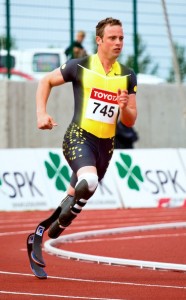
Used under the Creative Commons License
Katelyn Lamb, Content Editor
Oscar Pistorius, affectionately dubbed Blade Runner by fans, has long made waves in the sports world as the first amputee runner to compete at an Olympic Games in addition to participating in numerous Paralympic games. The South African runner has won six gold medals as a paralympian, set and broken world records in track and has also served as an ambassador for the Mineseeker Foundation, a charity dedicated to the removal of dangerous landmines.
Having received his first pair of prosthetic legs as a toddler, Pistorius is familiar with navigating shaky ground. However, recent events have the athlete in new and unfamiliar territory.
In the early hours of February 14, 2013, Reeva Steenkamp was shot to death while in a bathroom by her boyfriend, Oscar Pistorius. Currently on trial for murder, the track star has pled not guilty of the charges. Pistorius continues to maintain his plea of innocence despite suspicious circumstances against him.
On the one hand, the Blade Runner’s excuse for the murder seems illogical and weak. Claiming he mistook his girlfriend for an armed intruder, Pistorius justifies the killing as self-defense. Supposedly, the runner believed his girlfriend to be in bed next to him and, hearing someone in the bathroom, shot through the locked door four times. This supposed mistake lead to Steenkamp’s death.
A few key points of evidence will greatly impact the verdict of the trial. According to CNN, four pieces of evidence – a series of loud bangs, screams, Pistorius’ attitude towards guns and his interaction with a security guard – are aspects of the tragic night that will play a significant part in determining the truth. Were the bangs heard by nearby neighbors the sounds of gunshots or the sound of a horrified boyfriend beating down the bathroom door? Were the screams emanating from a woman threatened by a violent fight with her companion or did the yelling come from a grief-stricken man who made a fatal mistake? Additionally, the prosecution notes two previous episodes involving Pistorius and firearms, questioning whether Blade Runner has a trigger-happy tendency that could more reasonably lead him to murder. Or is Pistorius’ history with his gun nothing but a misunderstood, though legitimate, aspect of his personality? Finally, the runner’s interaction with a security guard after the murder will be a crucial detail of the verdict. After neighbors alerted security to the sound of gunshots, did Pistorius lie and tell the guard everything was fine? Were these words an attempt to cover up a murder or a thoughtless statement made in a moment of shock?
Since there are no direct witnesses to the murder, small details and circumstantial evidence will greatly affect the case’s verdict. Whether found innocent or guilty, the death of Reeva Steenkamp has cast a long and dark shadow across the illustrious career of the Blade Runner.